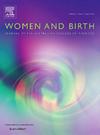Psychological implications of attending a birth review: A pre-post observational study of birth experience and post-traumatic stress symptoms
IF 4.1
2区 医学
Q1 NURSING
引用次数: 0
Abstract
Background
Birth reviews provide a space to talk about birth experiences. Women report finding them helpful, but their specific psychological impact has not been explored. This study investigated whether childbirth experience, perception of birth as traumatic, post-traumatic stress symptoms, shame, and self-compassion changed following a birth review. Psychological flexibility was also examined as a potential predictor of any changes.
Method
Women in the postnatal period (N = 211), who had been referred or self-referred for a birth review, were invited to participate in a pre-post observational study. Birth reviews were completed by midwives from the maternal mental health service trained in the five-step model for listening to women after childbirth. Birth reviews form part of an integrated childbirth trauma service with potential for psychological referral. Eighty-five participants completed baseline measures examining childbirth experience, post-traumatic stress symptoms, shame, self-compassion, and psychological flexibility before their birth review. Two to six weeks after their birth review, 70 participants repeated the same measures. Pre-post comparisons from 70 women were analysed, as well as conducting intention-to-treat analyses.
Results
Perception of the birth as traumatic significantly reduced, and perception of childbirth experience, levels of shame, and post-traumatic stress symptoms all significantly improved following birth review. There was no significant change in total self-compassion. Psychological flexibility did not predict post-review scores when controlling for baseline levels.
Conclusions
Midwifery birth reviews using the presented model may improve perceptions of childbirth and reduce traumatic birth perception, post-traumatic stress symptoms, and trauma-related shame. A randomised controlled trial is now required.
参加出生回顾的心理影响:出生经历和创伤后应激症状的前后观察研究。
背景:出生回顾提供了一个谈论出生经历的空间。女性报告说它们很有帮助,但它们具体的心理影响还没有被研究过。本研究调查了分娩经历、对分娩创伤的感知、创伤后应激症状、羞耻感和自我同情在分娩复查后是否发生了变化。心理灵活性也被视为任何变化的潜在预测因素。方法:产后妇女(N = 211),被推荐或自我推荐进行出生检查,被邀请参加一项前后观察性研究。分娩审查由产妇心理健康服务机构的助产士完成,助产士接受过五步模式的培训,以便在分娩后倾听妇女的意见。分娩复查是综合分娩创伤服务的一部分,具有心理转诊的潜力。85名参与者在分娩前完成了分娩经历、创伤后应激症状、羞耻感、自我同情和心理灵活性的基线测量。在出生后两到六周,70名参与者重复了同样的测量方法。对70名妇女的前后比较进行了分析,并进行了意向治疗分析。结果:分娩创伤性知觉显著降低,分娩经验知觉、羞耻感、创伤后应激症状均显著改善。总的自我同情没有显著的变化。在控制基线水平时,心理灵活性并不能预测回顾后的得分。结论:使用本模型的助产士分娩回顾可以改善分娩感知,减少创伤性分娩感知、创伤后应激症状和创伤相关羞耻感。现在需要进行随机对照试验。
本文章由计算机程序翻译,如有差异,请以英文原文为准。
求助全文
约1分钟内获得全文
求助全文
来源期刊

Women and Birth
NURSING-OBSTETRICS & GYNECOLOGY
CiteScore
7.20
自引率
13.20%
发文量
371
审稿时长
27 days
期刊介绍:
Women and Birth is the official journal of the Australian College of Midwives (ACM). It is a midwifery journal that publishes on all matters that affect women and birth, from pre-conceptual counselling, through pregnancy, birth, and the first six weeks postnatal. All papers accepted will draw from and contribute to the relevant contemporary research, policy and/or theoretical literature. We seek research papers, quality assurances papers (with ethical approval) discussion papers, clinical practice papers, case studies and original literature reviews.
Our women-centred focus is inclusive of the family, fetus and newborn, both well and sick, and covers both healthy and complex pregnancies and births. The journal seeks papers that take a woman-centred focus on maternity services, epidemiology, primary health care, reproductive psycho/physiology, midwifery practice, theory, research, education, management and leadership. We also seek relevant papers on maternal mental health and neonatal well-being, natural and complementary therapies, local, national and international policy, management, politics, economics and societal and cultural issues as they affect childbearing women and their families. Topics may include, where appropriate, neonatal care, child and family health, women’s health, related to pregnancy, birth and the postpartum, including lactation. Interprofessional papers relevant to midwifery are welcome. Articles are double blind peer-reviewed, primarily by experts in the field of the submitted work.
 求助内容:
求助内容: 应助结果提醒方式:
应助结果提醒方式:


